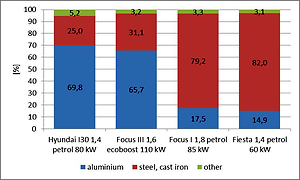Current issue
Online first
Archive
About the Journal
Aims and scope
Publisher and Editorial
Advertising policy
For Authors
Paper review procedures
Procedures protecting authentic authorship of papers
Paper preparation manual
Plagiarism check
Publication ethics
Reviewers
APC
Editorial and Scientific Board
Contact
Reviewers
Ecological comparative assessment of selected materials used for the construction of spark ignition engines
1
Faculty of Mechanical Engineering and Mechatronics, West Pomeranian University of Technology in Szczecin, Poland
Submission date: 2020-09-21
Final revision date: 2020-10-06
Acceptance date: 2020-10-08
Publication date: 2020-12-20
Corresponding author
Małgorzata Mrozik
Faculty of Mechanical Engineering and Mechatronics, West Pomeranian University of Technology in Szczecin, Al. Piastów 19, 70-310, Szczecin, Poland
Faculty of Mechanical Engineering and Mechatronics, West Pomeranian University of Technology in Szczecin, Al. Piastów 19, 70-310, Szczecin, Poland
Combustion Engines 2020,183(4), 11-14
KEYWORDS
TOPICS
ABSTRACT
The aim of the article is to present the environmental effects of changes in material composition in selected internal combustion engines used in passenger cars using LCA analysis. The levels of energy consumption and emissions of pollutants related to material inputs occurring at the stage of engine production have been determined. The simplified LCA model presented in the paper shows the energy consumption and total CO2 and SO2 emissions on the basis of the mass of materials from which the engine is made. The research results presented in the paper give a picture of a modern passenger car engine on the basis of wear and the degree of recovery of materials used for its construction.
REFERENCES (12)
1.
MERKISZ, J. Ekologiczne problemy silników spalinowych. Wydawnictwo Politechniki Poznańskiej. Poznań 1998.
2.
MERKISZ, J. Ekologiczne aspekty stosowania silników spalinowych. Wydawnictwo Politechniki Poznańskiej. Poznań 1995.
3.
International Organization for Standardization (ISO), 2006. 14040 – Environmental Management. Life Cycle Assessment. Principles and Framework.
4.
International Organization for Standardization (ISO), 2006. 14040 – Environmental Management. Life Cycle Assessment. Requirements and Guidelines.
5.
PN-EN ISO 14040. Zarządzanie środowiskowe – Ocena cyklu życia – Zasady i struktura. Polski Komitet Normaliza-cyjny, czerwiec 2006.
6.
PN-EN ISO 14040. Zarządzanie środowiskowe – Ocena cyklu życia – Wymagania i wytyczne. Polski Komitet Nor-malizacyjny, lipiec 2006.
7.
KULCZYCKA, J. Ekologiczna ocena cyklu życia (LCA) nową techniką zarządzania środowiskowego. IGSMiE, Kraków 2001.
8.
MERKISZ, J., KURCZEWSKI, P., LEWICKI, R. Wybrane aspekty prośrodowiskowego projektowania silników spalinowych. Wydawnictwo Politechniki Poznańskiej. Poznań 2007.
9.
Environmental Life Cycle Assessment of products, Part 1 – Guide, Part 2 – Backgrounds, NOH 1992.
10.
KOWALSKI, Z., KĘDZIERSKA, D., NOWAK, A.K. et al. LCA analysis of processing of the zinc and lead ores in Trzebionka Mining Works. 10th Conference on Environment and Mineral Processing, VŠB-TU Ostrava. Proceedings Part II, 22-24.06.2006, 105-115.
11.
Dyrektywa 2000/64/EC of the European Parliament and of the Council, On the type-approval of motor vehicles with regard to their re-usability, recyclability and recoverability and amending Council Directive 70/156/EEC, 26 November 2005, Official Journal L 310.
12.
BIRAT, J., GUERIN, V., ROCCHIA, L. et al. 2004. Ecodesign of automobiles based on the environmental properties of body materials. SAE Technical Paper. 2004-01-0250.
CITATIONS (1):
1.
The material and economic assessment of the life cycle of city buses in the operational phase
Paweł Regulski
Combustion Engines
Paweł Regulski
Combustion Engines
Share
RELATED ARTICLE
We process personal data collected when visiting the website. The function of obtaining information about users and their behavior is carried out by voluntarily entered information in forms and saving cookies in end devices. Data, including cookies, are used to provide services, improve the user experience and to analyze the traffic in accordance with the Privacy policy. Data are also collected and processed by Google Analytics tool (more).
You can change cookies settings in your browser. Restricted use of cookies in the browser configuration may affect some functionalities of the website.
You can change cookies settings in your browser. Restricted use of cookies in the browser configuration may affect some functionalities of the website.



